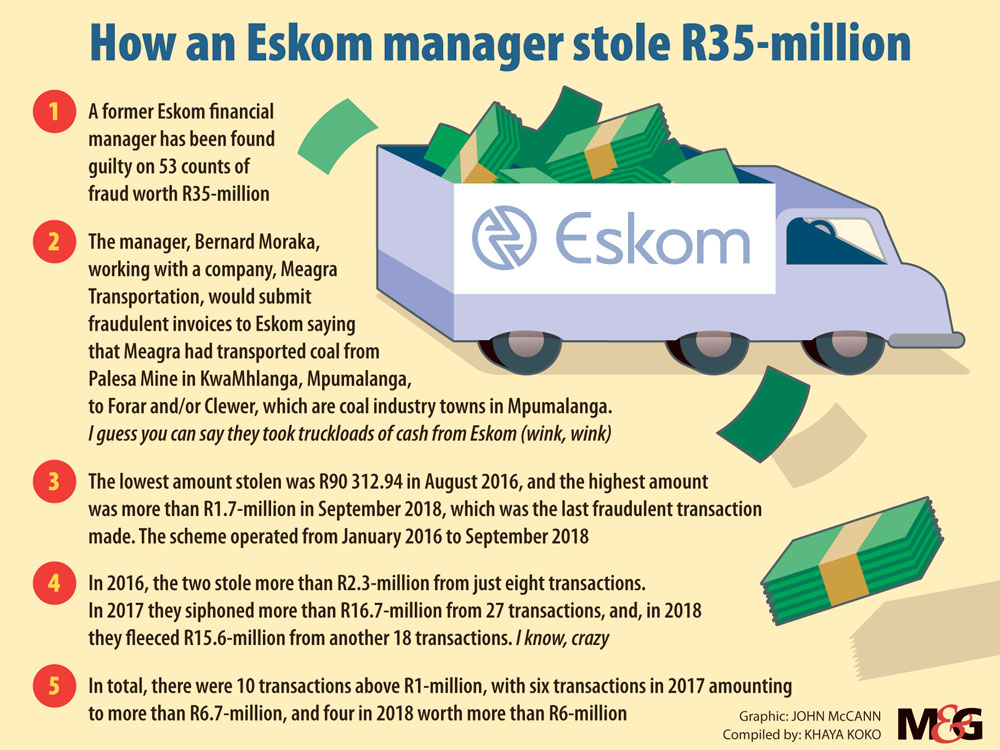In a country where electricity is essential for daily life, it is fast becoming a privilege rather than a right in South Africa. (David Harrison)
Bernard Moraka, Eskom’s former financial controller who defrauded the power utility of R35-million in a “syndicated scheme” that was “a crime against humanity”, should receive more than 450 years’ imprisonment for his criminal conduct.
This was the contention of prosecutor Bongani Chauke, who, on Wednesday, told the Johannesburg specialised commercial crimes court that Moraka should be punished for his part in Eskom’s losses of R178-billion through fraud and corruption.
Chauke was speaking during the sentencing hearing of Moraka and his co-accused, Victor Tshabalala, who were both convicted of 53 fraud counts for their two-and-a-half year scam at Eskom, which comes as the power utility is struggling to keep the lights on.
The scam entailed the creation of 53 fictitious invoices from January 2016 to September 2018 by Moraka, who would record Tshabalala’s company, Meagre Transportation, as having done work for Eskom, and then deposit payment into Meagre’s account for work not done.
The money was funnelled into various accounts and shared by both fraudsters.
Moraka pleaded for leniency in sentencing, saying he was remorseful for his crimes. Tshabalala echoed him and asked for a five-year prison sentence.
But Chauke rejected their pleas for mercy, saying the two had brought the situation on themselves by creating a “premeditated theft scam”.
He added that the court should impose a punishment that fits the crime, including the legislated 15 years’ imprisonment minimum sentence for each of the 30 fraudulent invoices valued above R500 000, which would ensure at least a 450-year sentence.
“What these accused have done has exacerbated load-shedding and has affected the economy. Goodness knows what a business goes through when it has to shut down operations for up to eight hours in a day,” said Chauke.
“There are no compelling and substantial circumstances for this court not to deviate from the [15 years legislated] minimum sentence.”

The lowest amount stolen was R90 312.94, which was the fourth fraudulent transaction and was made in August 2016. The highest and last invoice paid was the 53rd in September 2018, when they syphoned off more than R1.7-million.
Eight transactions were claimed in 2016, and R2.3-million was stolen between January and December of that year.
More than R16.7-million was paid out in 2017 in 27 transactions, and more than R15.6-million in 2018 in 18 transactions.
In 2017 and 2018, Moraka and Tshabalala scored more than R1-million in 10 payments. In 2017, six payments exceeded R1-million and four were above the R1-million mark in 2018.
In total, Moraka and Tshabalala made off with R34 984 427.57.
Chauke’s argument that both fraudsters deserved a harsh sentence was echoed by Christo Kruger, Eskom’s chief financial adviser in the primary energy division, who testified at the hearing on behalf of the state. He said Moraka and Tshabalala’s crimes were part of destroying Eskom as a company, and South Africa as a country.
“If the court does not show to the country and the rest of the Eskom employees that corruption doesn’t pay, that will be a disservice,” Kruger testified.
He added that the court should give the “maximum sentence that is [the same magnitude] as murder because corruption is a crime against humanity”.
Moraka’s former wife, Jane Moraka, who also testified on the state’s behalf on Wednesday, said that her former husband had lied when he stated under oath in court that he had shared half his R509 000 Eskom pension payout with her and their two children shortly after his resignation in 2018.
Jane Moraka was called by the prosecutor, who investigated Moraka’s claims after he had testified that his pension money had run out because he had shared half of it with his former wife.
“I do not know anything about that pension money. I did not get a single cent from that pension,” Jane Moraka said.
Asked by Chauke whether her two children were also part of the international trips valued at more than R400 000 to places such as Paris in France and Disneyland in the United States, Jane Moraka said her children were never invited.
“The last time my children saw their father was on 4 December 2011,” she said.
She did, however, say that Moraka had given her R37 000 from the proceeds of the sale of his house, which the fraudster had said in a November 2018 affidavit was a paid-up property worth R2.5-million.
Sentencing for both men is expected in late March. Moraka and Tshabalala remain out on bail of R20 000 each.
[/membership]